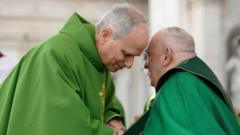In a momentous election, Cardinal Robert Francis Prevost was elected the 267th pope of the Roman Catholic Church, assuming the papal name Leo XIV. His election marks a significant milestone as he becomes the first pope from the United States, a choice that defied long-held beliefs regarding the church’s leadership selection. Cardinal Prevost, 69, greeted the gathered crowd in St. Peter’s Square with the words, “Peace be with you,” signalling his commitment to peace and justice.
**Pope Leo XIV: A Historic Moment for the Global Catholic Church**

**Pope Leo XIV: A Historic Moment for the Global Catholic Church**
Former Cardinal Robert Francis Prevost makes history as the first American pope, Leo XIV, bringing a message of peace and unity to the world's 1.4 billion Catholics.
Prevost, known for his extensive ministry in Peru and his role as a cardinal under Pope Francis, is seen as a balanced leader designed to unify the church amid ongoing ideological discussions within the clergy. His election followed the death of Pope Francis and was met with enthusiastic celebrations not just in the Vatican, but also in Chicago, where he was born. The conclave concluded with white smoke rising from the Sistine Chapel, indicating a pope had been chosen after more than 24 hours of deliberation. Leo XIV’s inaugural address focused on building bridges within the community, echoing core directives of Pope Francis.
Onlookers, both in Vatican City and across the U.S., reacted with a mix of excitement and surprise upon hearing the name of the new pontiff. His background as a Chicagoan who dedicated significant time to ministry in Peru lends him a unique perspective as he assumes leadership, making headlines across international news platforms.
Pope Leo XIV’s agenda appears aligned with that of his predecessor, emphasizing outreach to the marginalized and a commitment to social issues, particularly concerning climate change and immigration. Moreover, questions arise about his approach to LGBTQ issues, with contrasting views on doctrinal teachings and inclusivity. As reactions unfold, added scrutiny is on how his papacy might reshape perceptions of the Catholic Church amidst a politically polarized landscape.
In his first address, Leo XIV also expressed gratitude to Pope Francis, asserting the enduring influence of his predecessor's blessing for the Church. As he embarks on this formidable journey, many are left wondering how this pivotal election will influence the fabric of the Catholic faith in America and beyond while navigating the global complexities facing the church community today.
In closing, Pope Leo XIV’s election initiates a new chapter in the Roman Catholic Church's history, promising potential change at a time when it is considered essential for communion and healing across the faithful.
Onlookers, both in Vatican City and across the U.S., reacted with a mix of excitement and surprise upon hearing the name of the new pontiff. His background as a Chicagoan who dedicated significant time to ministry in Peru lends him a unique perspective as he assumes leadership, making headlines across international news platforms.
Pope Leo XIV’s agenda appears aligned with that of his predecessor, emphasizing outreach to the marginalized and a commitment to social issues, particularly concerning climate change and immigration. Moreover, questions arise about his approach to LGBTQ issues, with contrasting views on doctrinal teachings and inclusivity. As reactions unfold, added scrutiny is on how his papacy might reshape perceptions of the Catholic Church amidst a politically polarized landscape.
In his first address, Leo XIV also expressed gratitude to Pope Francis, asserting the enduring influence of his predecessor's blessing for the Church. As he embarks on this formidable journey, many are left wondering how this pivotal election will influence the fabric of the Catholic faith in America and beyond while navigating the global complexities facing the church community today.
In closing, Pope Leo XIV’s election initiates a new chapter in the Roman Catholic Church's history, promising potential change at a time when it is considered essential for communion and healing across the faithful.




















